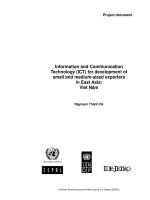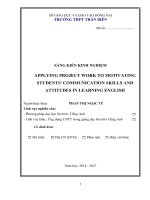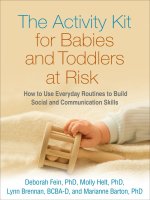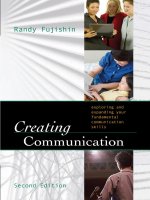Communication skills and personality development 121
Bạn đang xem bản rút gọn của tài liệu. Xem và tải ngay bản đầy đủ của tài liệu tại đây (4.45 MB, 127 trang )
Subject: Communication Skills and Personality Development
Course Code: BCA (PC) 121
Vetter-
Lesson no: 01
Author-Dr.Pallavi
PERSONALITY DEVELOPMENT
1.0 Learning Objectives
1.1
Introduction
1.2
Personality Development and Major Determinants
1.2.1 Four Building Blocks
1.2.2 Important tips of Emotional Display
1.2.3 Main characters
1.3 Benefits of Personality Development
1.3.1 How to generate Good ideas
1.3.2 How to develop the ideas
1.3.3 Some General rules for reading
1.3.4 Traits for building Positive Personality
1.4
Check your progress
1.5
Summary
1.6
Keywords
1.7 Self-Assessment Test
1.8 Answers to check your progress
1.9 References/Suggested Readings
1.0Learning Objectives
1. The students will be able to perform well on social ground.
2. To help the student to be creative, and analytical.
3. To develop their own specific skills.
4. Polishing manners to behave appropriately in professional circles.
5. Developing and maintaining optimistic nature.
6. Understanding the art of entertaining.
1.1 Introduction
Personality is defined as the form of characteristic thoughts, feelings and behavior that
differentiate one individual from the other and it persists over time. It is the sum total of ways in
which an individual reacts and interacts with others. Infect, it generally implies to all what is
unique about an individual, the quality that makes one stand out in a crowd.
Personality traits are different to each other and could be a mixture of bot/h good and
bad. It is a step towards improvement and development of talents and potentials, enhancing
quality of life, realization of dreams and aspirations. The stages include formal and informal
activities and the leaders must realize the full potential of each individual in a group. Hence, the
process of improving or transforming the personality is called personality development.
1.2Main Body of the text
Personality Development and Major Determinants
The concept has been interpreted in different ways by different people, thinkers, psychologists,
yet most of them are unanimous in affirming that personality is something integral; it is not
simply a cluster of mental or physical qualities but the unique and unrepeatable combination of
characteristics of each individual.
We can simply explain personality as the product of the „quality influential” effects of
innate hereditary, environment and culture.
Diagram
1. Heredity-The factors that were determined at conception, Physical structure, facial
attractiveness, gender, temperament, energy lend, that are considered to be either
completely or substantially influenced by whom you are associated with.
2. Environment-The factors that exert pressures on our personality formation are the
culture in which we are raised, the norms among our family and social groups. The
environment plays a major role in shaping our personalities.
3. Situation- An individual‟s personality generally stable & consistent does change in
different situations. The varying demand of different situations calls forth different
aspects of one‟s personality.
4. Emotional Competence- It is the awareness of the emotions one has. People with
emotional competence will know which emotion they are feeling and why. They realize how
their feelings affect their performance. They have a guiding awareness of their values and goals.
1.2.1 Four Building Blocks of sPersonal Competence- These competencies determine how we
manage ourselves. People with this competence are attentive. They help out the situation based
on understanding of other peoples‟ needs & feelings.
1. Self – regulations- It means proper management of one‟s internal states, impulses and
resources. It implies self-control and keeping disruptive emotion and impulse in check. It
gives the capacity of adaptability and flexibility in handling change.
2. Motivation- The important things that guide or facilitate reaching the aimed goals:- First
the achievement drive that improves or meets a standard of excellence. The commitment
of siding with the goals of the group. A major tip of readiness act on opportunities. And
fourth of resistance in pursuing goals, dispute obstacles and setbacks.
3. Social Competence- It helps in understanding others, sensing others feelings perspective,
and taking an active interest in their concerns. This gives rise to service orientation. This
helps in the possibilities of leveraging diversity and cultivating opportunities through
different kinds of people.
1.2.2 Some important tips of Emotional Display
The art of inspiring others is to make tactical use of emotional displays by showing our emotions
and feelings for effect and clarifying that we are using them in a planned manner.
1. Control of your emotions, concentration on your nervous system which must match your
emotions
2. Practice showing positive and negative emotions even when you don‟t feel that way
inside.
2. Be explicit about your feelings.
3. Save emotional displays otherwise you will be unfit for your designated role.
1.2.3Main Characteristics
Personality describes the relatively stable set of characteristics, tendencies and temperaments.
Personality traits are enduring characteristics that describe an individual‟s attitude and behavior.
1. Openness to experience- It characterizes the degree to which people are interested in
broadening their horizons or limiting their, learning new things, meeting new people,
going to new places. Professionals who are open to experience are more willing to reflect
on feedback for personal development.
2. Agreeableness- It measures the degree to which a person‟s friendly or reversed, cooperative or guarded, flexible or inflexible, trusting or cautions, good natured or moody.
Being too agreeable could cause a person to be too accommodating; however the others
may take advantage of these weaknesses.
3. Conscientiousness- It represents the degree to which a person is consistent or
inconsistent, can be reliable or not, thorough, organized, hardworking etc. Those who
score lower on this dimension are more likely to be viewed as inattentive to detail,
uncaring, disrespectful, not interested or motivated, unorganized, apt to give up easily.
4. Extroversion- It represents the degree to which an individual‟s social or antisocial,
outgoing or shy. A person who rates high for first traits is extroverted. Extroversion or
introversion, in itself, is not necessarily bad, but extremes at both the ends of the
spectrum can be equally destructible
1.3 Further Main Body of the text
Benefits
1. Self Confidence- It is an important trait required to face success. Confident people
admire the characters in others, their chiefs, their friends, their family and their peers.
Admiring confidence from others will also enhance our idea towards raising selfconfidence. It also deals with two major factors- Self-esteem and self-efficacy. We
develop a sense of self-efficacy in ourselves by acquiring skills and knowledge. This will
increase our confidence levels to learn and work hard. The level of confidence will
always boost us to face the risks and crisis. Self-esteem breaks down the negative forces
and fear of facing failures.
2. Credibility- In the current modern era is one of the noticeable persons. A book cannot be
judged from its outer cover, in a similar way, an individual cannot be judged from their
outlooks. A best personality will be covered by their shabby looks and inexpensive
dresses. So, it is always good to show up a credible outlook by enhancing your physical
features.
3. Interpersonal skills- These are performed everyday which includes interaction with other
people. These are more centered on communication, listening, questioning and understanding.
People with good interpersonal skills will be able to work well in a team or group without
hesitation.
3. Leadership qualities- It encourages leading and motivating others. A good leader always
motivates this group in a positive manner. An efficient leader must have a fulfilled
knowledge of motivation factors over others. A major take-away point on leadership is,
“To be an effective leader, you must be self-ruling yourself and self-motivating yourself.
4. Curiosity- A wrong word can lead to major destruction in an environment. We should
say the right things at right places to make others feel sophisticated and comfortable.
5. Communication Skill- Communication is defined as sharing the information from one
place to the other either vocally, written, visually or non-verbally. Information
transmittance must be clear and understandable to make the listening group. The ability
to communicate information accurately and clearly is an important life oriented skill.
1.3.1 How to Generate Good Ideas
An idea is a specific thought or concept that arises in the mind of a person as a result of thinking.
It is the divine inspiration of God. The marvels of those who lived before us rule and magnifies
the world today. Ideas have always been vital in arousing public opinion and bringing about a
reform whether it was the freedom struggle or the eradication of a social evil. It is the mind
boggling strength of ideas which facilitates our decision-making. Ideas give confidence to face
this competitive world. It is the idea which makes all the difference between floating and sinking
of a person's fortune in this world.
It is your idea which makes your destiny. Believe in the power of idea to change things.
Whatever you think, you become. Sooner or later, one who wins is the one who thinks and
believes he can. No wonder it is the power of idea that is shaping the dreams of life and guiding
the course of human civilization.
Levels of Thinking- The language of conscious thinking is either the mother tongue or the local
dialect of common use. For a learner thinking is very beneficial. Initially you may have to put in
a lot of effort but with regular practice it will start coming to you naturally. The effort will not
only gives strength to the thoughts but will also make the message linguistically impressive.
When nourished with hope and confidence and encouraged by ambition and aspiration, that
single idea takes shape as a dream, vision and goal in stages. The fact that remains is that the
ideas, however strange, unorthodox or heretic they might have seemed at the start, have
ultimately wrought miracles, brought revolutions and built civilization. Strong idea is an
outcome of strong faith. In the times of trial, when darkness surrounds you, when failure
confronts you, it is that strong idea and conviction which illuminates your life with a ray of hope.
Ideas in fact, are mightier than anything else. By providing inspiration, ideas work through the
arms and vigour of men. It is the only through their day-to-day ideas acquired through
knowledge and perseverance which makes them exceptional.
Ideas verify rule the world, and also the minds of men, they contribute to continuing
changes, shape as well as determine the destiny of human beings and contribute to the growth of
civilizations.
1.3.2 How to develop the Ideas
1. Reading Good Books-The reading always exercises the mind of the person. Books full
of knowledge enhance the personality of anyone. As it is said that books are the best
friends. Indeed many eminent authorities insist that this is the only satisfactory way in
which you can learn and develop some good content and can be helpful in generating
new ideas.
2. Write something every day- If you wish to write well, reading can help you a lot. You
must practice, incessantly practice. Write as much as you can, taking pains to improve
upon what only yesterday you regarded as your best. Model your work from some of the
great books.
3. Think for yourself- Think for yourself: How many learning people think for themselves?
very few indeed. Why should they think when they find it much easier to take their
opinions at the second end? To follow blindly what others do makes you dull.
4. Study Carefully & Try to create New Ideas-The way to form your style is to study
carefully and to have critical thinking. Read out good thinkers, have good company.
Always be enthusiastic in nature to face challenges.
1.3.3Some General Rules for ReadingThere is no direct road of the kind to which a person can be led. The only answer that is a guide
can make the traveler find his way.
1. Read
2. Observe
3.Think
4.Practice
Reading:- Reading does not mean that a person should carry a book in his hand or in his pocket,
nor does it mean that he should cast a cursory glance at its pages or merely turn them over
mechanically without noting what is contained in them. To read a book is to live in the world,
'ever fresh,ever new' created by the author. Books are people with creatures that are more real
than the actual things of this world, and to enjoy their company is the happiest moment of our
life. When we read a great author, we are,' laid asleep in body,' become 'a living soul,' and see
into' the life of things.
According to Bacon
"Reading makes a full man, conferences a ready man, and writing an exact man."
How to Read-Some books appear dull and tiresome to the beginner, but once he has grown
familiar with them he feels that reading them has been an inspiring experience. One should not
read a book mechanically, but should try to put oneself in the writer's place and forget one's own
existence for the time being to live with the author, feel with him and enter into mental
communication/ interaction with him in every possible way.
Our life is so little and so short that for the sake of change only, if for nothing else, we must get
out of it through books and reading and see newer points of view. The ever-present " I" is not
always a blessing and books help to destroy it for the time being. A teacher used to say that
students cannot write because a good writer's memory must echo quotations from great writers.
"A good book is the precious life blood of a master spirit, embalmed and measured upon purpose
to a life beyond life."
You will do well, therefore, to enrich the quality of your own thought by allowing it to flow into
the higher thoughts of men who were in their generation the interpreters of the deeper things of
life.
According to Dr. Brown‟s
"You must eat the book, you must crush it, and cut it with your teeth, and swallow it,"
What to Read- Everyone has his own favorites for both subject and treatment, so that each must
decide for himself what books he is going to make his companions, his benefactor.
Observation- But reading is not everything. As the person reads he must observe. He must not
allow his powers of observation to lie dormant. There are some people who go through the world
with their eyes shut; as it were to the beauties of Nature. One can discover 'tongues in trees,
sermons in stoner, book in running brooks and good in everything.'
Thinking- There is a saying," One may lead a horse to water, twenty cannot make him drink."
And too often the person finds that he may lead, or even drive, a boy to books, but he cannot
make him think. There is no fixed rule for making a boy think- even the come sometimes fails but probably the best mode is to endeavour to arouse his interest and Curiosity. Dr. Brown says,"
Above all try to get hold of their affection, and make them put their heart into their work."
Personal Grooming & Habits
Daily habits might not be too hard, but what about those habitual behaviors that you dislike.
These are the habits that are hard to change. A habit is an activity that is acquired, done
frequently, done automatically and difficult to stop.
Habits can be good or bad. Good habits help us get through our daily lives.
In general, habit is a recurrent, often unconscious pattern of behavior that is acquired through
frequent repetition. In truth a habit is a complicated set of thoughts, emotions and behaviors that
we repeat again & again.
So changing habits requires rewiring the brain, retraining the pathway of the neurons to
live up with something new.
Trying to change too many things is a recipe for failure because it's unrealistic that we
can change a habit we've had for years overnight-let alone two or three habits at the same time!
Human beings are creatures of habit and making changes doesn't come easily. It takes consistent
new action over a period of time to reinforce the new way of thinking. Taking small, baby steps
everyday builds inner strength and the capacity to integrate the natural effects of your new
behavior, which also gives you the time to integrate and get comfortable with your new way of
thinking.
How to Start
1. Start a baby step. Instill a new habit to begin.
2. Go for a level of thought. If you want to start, spend 30 days practicing this thought
every day.
3. Think in terms of creating a new habit instead of breaking an old one.
4. Try to support your thoughts to gain much
1.3.4 Traits for Building Positive Personality
Accept Responsibility- "The price of greatness is the responsibility." By Winston
Churchill
According to Elber Hubbard "Society is not destroyed by the activities of the
rascals, but by the inactivity of good people”
Show Consideration-The effective point is courtesy, politeness and caring. 3.
Choose your words carefully-The principle is your speaking must be better than
silent, rather be silent. Words spoken out of bitterness can cause irreparable damage.
The way the parents speak to their children in many instances shapes their
children's destiny.
Smile and be kind- To get success, smile is the shortest distance between two
people.
Put Positive interpretation on other people's behaviour- We see the world not
as it is, but as we are. So when we are interpreting other people‟s behaviour,
negativity we just reflecting our own mentality to this situation. In contrast when
interpret positivity, chances that other people may realize its negativity and change
or amend this.
Be a Good Listener- Effective communication, is 50% listening, 25% speaking,
15% reading and 10% writing. So when we listen carefully then 50%
communication is done.
Be Enthusiastic- Nothing great can be done unless you change your attitude. 8.
Give honest and sincere Appreciation- The desire to feel important is one of
the greatest cravings in most of the human beings and it can be a great
motivator. Hones and sincere appreciation makes one feel important and
promote these positive qualities in him.
Acceptance of mistakes- Mistakes are to be learned from, so accept it immediately
and make change.
Discuss but don't argue- Arguing is like fighting a losing battle. Even if one wins
in the argument, the cost may be more than the worth of victory. A victory is a
defeat itself.
Don't Gossip- Gossip may lead to slander and defamation of character. People
who listen to gossip are as guilty as those who do the gossiping.
Practice Loyalty- An ounce of loyalty is worth more than a pound of cleverness.
loyalty will pay you in the long run. Loyalty is the trait which makes the trust
strong.
Be Understanding & Caring- The best way to be understood is to be
understanding. And the basis of real communication is also understandable.
Develop a sense of humour- Have a sense of humour and you will possess the
ability to laugh at yourself. A sense of humour makes a person like able and
attractive. Some people are humour impaired.
To have a friend be a friend- Mutual understanding and confidence are the
foundations stones of all friendship.
Each one of us faces situation that affects mental, physical and psychological activities.
In such a situation, a tension is created which is known as stress. Stress influences
the activities of a person both positively as well as negatively. Generally, it is observed
that the efficiency of a person is reduced in the situation of stress. A stressed personality
is never loved or appreciated. Keeping this fact in mind, stress management has also
become a part of personality development. How to control emotions, how to adjust are
the things to ponder.
How stress affects an Individual
In the modern competitive world, every individual faces the effects of stress in different
ways. Stress sometimes affects the efficiency of some people in a positive manner, they start
working with more interest and efficiency due to stress.
Minimum Effect on Efficiency- When stress is of minimum or zero nature i.e
minimum control is made by the officers, then sub-ordinates don't work with full
interest. As a result, the level of efficiency gets reduced.
Favourable Effect- Under this, employees are not assigned increased work load
and also they are not given full freedom for work. Freedom to take decisions
enhances their working skills & efficiency. Under this type of stress, subordinates
get aware towards the goals due to which they get motivation to complete their
task.
Ways to Ease Stress
Exercise regularly- Aerobic exercise helps to release stress, that help you feel
better and
maintain a positive attitude.
Stop eating unhealthy food- Excessive eating of unhealthy food may arise
diseases & affects the nutrition Chart.
Practice relaxation techniques- You can choose from a variety of techniques, such
as deep breathing, imagery, progressive muscle relaxation, and mindfulness
meditation.
Examine your values and live by them- The more your action reflect your beliefs,
the better you will feel, no matter how busy your life is use your values when
choosing your activities.
Assert yourself- It's okay to say "No" to demands on your time and energy that will place too
much stress on you. You don't have always (have to meet the expectations) of others.
Set realistic goals and expectations- Be mindful of the things you can control and work on
accepting the things that you can't control. It's okay to realize you cannot be 100% successful in
one attempt.
Sell yourself to yourself- When you are feeling overwhelmed, remind yourself of what you do
well.
Connect with people- A good support of friends and family can ease your work troubles and
help you see things in a different way.
Work smarter, not hard- Working smarter means prioritizing y e.
Have some 'me time'- Sometimes our work, concentrating on the tasks that will make a real
difference.Setting aside a couple of nights a week for some quality "me time" away from work.
1.4 Check your Progress
1. What is the most important thing to me?
2. Why should I spend more or less time on going forward?
3. What is the purpose of my life?
4. From where do I get my motivation?
5. Name the characteristics of Mind & Strength?
(B)
1. The unique and relatively stable ways in which people think, feel, and behave is known as
____________.
2. The value judgments of a person's moral and ethical behavior are known as ____________.
3. The enduring characteristics with which each person is born are known as their
____________.
4. The level of the mind in which information is available but not currently conscious is called
the ____________.
5. The ____________ mind is the level of the mind that is aware of immediate surroundings and
perceptions.
1.5 Summary
Personality development helps an individual to inculcate positive qualities like punctuality,
flexible attitude, willingness to learn friendly nature, eagerness to help others and so on. Never
hesitate to share information with others. Always reach office on time. Some people have a
tendency to work till late. Late sittings not only increase your stress levels but also spoil your
personal life. Sitting till late at the office indicates that an individual is extremely poor in time
management skills.
Personality development helps you develop an impressive personality and makes you stand apart
from the rest. Personality development also plays an essential role in improving once
communication skills. Individuals ought to master the art of impressing their thoughts and
feelings in the most desired way. Personality development makes you a confident individual who
is appreciated and respected where ever he goes through.
1.6Keywords
1. Unique- not like anything else, different
2. Judgment- the ability to make decisions
3. Stable- firmly fixed
4. Tangible- perceptible by touch
5. Abstract-short summary
6. Temperament-attitude
7. Conscious- aware of surroundings
8. Embalmed-preserve from decay
9. Interpersonal-relating to relationships
1.7 Self- Assessment Test
1. The ____________ is the level of the mind in which thoughts, feelings, memories, and other
information are kept that is not easily or voluntarily brought into consciousness.
2. The ____________ is the part of the personality present at birth and completely unconscious.
3. The ____________ is the part of the personality that develops out of a need to deal with
reality, mostly conscious, rational and logical.
4. The ____________ is the part of the personality that acts as a moral center.
1.8 Answers to check your progress
1. Out of all the things that you want in life, there is one that is above them all. It could be
tangible or abstract. Take the time to ask yourself this question and answer it honestly. It will
point you to one thing that makes all others fall into place. With this singular target in mind, your
sense of direction is secure.
2. Majority of us spend time on the activities which are urgent and not the ones which are
important. Real productivity means getting the right things done. This question helps you to
prioritize the activities that have long term value over the ones that are short term as you develop
yourself
3. This is a poignant question to ask. When your life ends, what would you like to be
remembered for? This helps you to restructure your goals so as to make a difference in the lives
of those around you as well as your community. It also helps you to design your life according to
your taste and desire.
4. To become successful in life, you need to exert effort, apply dedication and be committed. To
give this amount of attention to any one activity, you need to be fully motivated in it. Therefore,
ask yourself what motivates you. Which reason do you have for getting up early in the morning
and sleeping very late at night in pursuit of success? Finding this reason is a huge step forward in
self-development.
5. Mind enriches & enhances knowledge for overall personality & becomes the guiding light for
a person to judge and resolve the problems according to the situation. Mind has the capability to
control himself from the fears of life. Thus, the strength of a person is his mind.
(B)
1. Personality
2. Character
3. Temperament
4. Preconscious
5. Conscious
1.9 References/ Suggested Readings
“Personality Development for students” by Dr. Vijay Aggarwal.
“The Power of your Subconscious Mind” by Joseph Murphy.
Subject- Communication Skills and Personality Development
Course Code- BCA (PC) 121
Vetter-
Lesson no:02
Author-Dr.Pallavi
BODY LANGUAGE
2.0 Learning Objectives
2.1
Introduction
2.2 Verbal Communication
2.2.1 Basic forms of communication
2.2.2 Factors influencing communication
2.2.3 Some desirable features
2.2.4 Undesirable features
2.2.5 Major components
2.2.6 Main things to remember
2.3 Non-Verbal Communication
2.3.1Types of speech
2.3.2 Oral communication
2.3.3 Written communication
2.4 Check your progress
2.5 Summary
2.6 Keywords
2.7 Self-Assessment Test
2.8 Answers to check your progress
2.9 References/Suggested Readings
Chapter – 2
Verbal and Non - Verbal Communication
2.0 Learning Objectives
To develop their communication skills through knowledge of personal phenomena
involved in the communication process.
To use different techniques in oral, written are known as verbal communication.
To recognize and formulate effective written and oral communication, giving
appropriate consideration to audience, context and format.
To analyze arguments so as to construct ones that are well supported, well-reasoned
and are controlled by thesis or exploratory question.
Communication is a process through which a person exchanges his ideas and
complexities of thought.
2.1Introduction
Every individual spends most of his time in communicating and interacting with others. A
businessman is required to communicate with various parties in the business activity. Be it
general communication or business communication, the desired results cannot be obtained unless
and a particular process is adopted for it. The term communication has been derived from the
Latin word “communis” or “communicare” which means „to make common‟. It is also defined as
sharing of information, options, thought and ideas which create mutual understanding between
individuals or employees working in the organization.
2.2 Main body of the textVerbal Communication
This term gains special importance in business as the whole business activity is
completely based on communication. It is a two way process in which a businessman interacts
with others in order to convey his opinion and to receive theirs. Thus, this type of specific
communication undertaken by a businessman or business firm is known as “business
communication”.
Definition
In words of J.C. Sherblom, “Business Communication is a dynamic, bi-directional,
multiply influenced and transformational process”. It becomes clear that business
communication refers to exchange of ideas and information among various parts of an
organization by the means of different modes and media.
2.2.1Basic forms of Communication
There are various forms and means used in communication. These means are also known
as methods, channels, media or mediums of communication.
Verbal Communication
When the communication is made through words, it is known as verbal communication. Thus,
this communication process involves the proper usage of words denoting a similar set of symbols
and signs between the sender and the recipient. That is why it is observed that most of the formal
communication in an organization takes place in a verbal form. So, verbal communication can be
studied in two forms namely „Oral Communication‟ and „Written Communication‟.
Language may be thought of as the code, the system of symbols, utilized in the construction of
messages. Language may be defined as a specialized, productive system capable of displacement
and composed of rapidly fading, arbitrary, culturally transmitted symbols.
1. Specialization-Language is a specialized communication system and it produces creative
responses. Introduction of new word is another quality of productivity.
2. Displacement- It has the ability to displace concepts and statements uttered in one place.
Mixed with productivity, it is also possible to tell a lie.
3. Speech sounds fade rapidly as they are short lived. Speech signals are probably the least
permanent.
4. Language signals do not possess any characteristics of the things for which they stand.
5. The form of any particular human language is traditionally transmitted to one another.
2.2.2Factors Influencing Communication
Age factor- A teacher's method of teaching is entirely different to a kid and an old
person in communication.
Gender Factor- This factor also plays a major role in communication.
Mindset Factor-All is the mindset factor that we work with. We must always have the
mindset up to treat everyone in the same way.
Everyone/ A person has to keep his mind open and go about in his work keeping in view
the factors, which influence the process of communication.
2.2.3Some desirable features
Good health and personality
Creativity, imagination and resourcefulness.
Kindness, Sympathy.
Patience and above average intelligence.
Courtesy, Sincerity & honesty.
Determination
Feedback
Promptness efficiency & ability to organize









